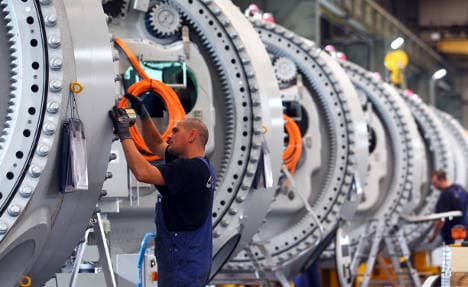Economy may contract despite rise in output

German industrial output rose in October, data showed on Wednesday, but analysts said the eurozone's biggest economy may still not be able to avoid a contraction at the end of the year.
Industrial production in October rose by a bigger-than-expected 0.8 percent in October compared to the previous month, the Economy Ministry said in a statement.
"Following two consecutive months of decline, industrial output saw something of a recovery in October," the ministry said.
The increase was not quite large enough to make good the 2.8-percent decline seen in September, however, it noted. And the ministry warned that, despite the modest pick-up, "the visible restraint in evidence in the third quarter is set to continue.
"Given the cautions development in industrial orders, output will remain subdued in the coming months," it said.
Just a day earlier, separate industrial orders data showed an unexpectedly strong jump of 5.2 percent in October, raising hopes that Europe's top economy is standing up to the ongoing turmoil in the eurozone. But analysts were not so sure.
"The current data look better than they really are," said Postbank Research economist Heinrich Bayer.
"The rise in October is not enough to offset even a third of the decline seen in September. On top of this, it's not a real recovery, but the unusual timing of the school holidays will have distorted the numbers," the economist said.
Commerzbank economist Ralph Solveen similarly believed that the downward trend in German industry remained intact.
"The tendency... points to a sharp decline in output in the fourth quarter," he said. "And that means the economy is a whole is likely to contract."
Jennifer McKeown, senior European economist at Capital Economics in London, said the October output data came as "something of a relief, but the business surveys point to renewed falls to come."
The October increase "did not reverse September's sharp 2.8-percent fall and the level of industrial output remains weaker than in the third quarter on average," she said.
"This suggests that Germany might still have entered a recession in the fourth quarter."
ING Belgium senior economist Carsten Brzeski was not quite so pessimistic.
"It is too early to give the all-clear, but latest developments indicate that the weakening of the German economy in August and September was not the prelude to a gloom-and-doom scenario," he said.
"The current growth episode increasingly looks like a soft patch, not a recession."
AFP/mry
Comments
See Also
Industrial production in October rose by a bigger-than-expected 0.8 percent in October compared to the previous month, the Economy Ministry said in a statement.
"Following two consecutive months of decline, industrial output saw something of a recovery in October," the ministry said.
The increase was not quite large enough to make good the 2.8-percent decline seen in September, however, it noted. And the ministry warned that, despite the modest pick-up, "the visible restraint in evidence in the third quarter is set to continue.
"Given the cautions development in industrial orders, output will remain subdued in the coming months," it said.
Just a day earlier, separate industrial orders data showed an unexpectedly strong jump of 5.2 percent in October, raising hopes that Europe's top economy is standing up to the ongoing turmoil in the eurozone. But analysts were not so sure.
"The current data look better than they really are," said Postbank Research economist Heinrich Bayer.
"The rise in October is not enough to offset even a third of the decline seen in September. On top of this, it's not a real recovery, but the unusual timing of the school holidays will have distorted the numbers," the economist said.
Commerzbank economist Ralph Solveen similarly believed that the downward trend in German industry remained intact.
"The tendency... points to a sharp decline in output in the fourth quarter," he said. "And that means the economy is a whole is likely to contract."
Jennifer McKeown, senior European economist at Capital Economics in London, said the October output data came as "something of a relief, but the business surveys point to renewed falls to come."
The October increase "did not reverse September's sharp 2.8-percent fall and the level of industrial output remains weaker than in the third quarter on average," she said.
"This suggests that Germany might still have entered a recession in the fourth quarter."
ING Belgium senior economist Carsten Brzeski was not quite so pessimistic.
"It is too early to give the all-clear, but latest developments indicate that the weakening of the German economy in August and September was not the prelude to a gloom-and-doom scenario," he said.
"The current growth episode increasingly looks like a soft patch, not a recession."
AFP/mry
Join the conversation in our comments section below. Share your own views and experience and if you have a question or suggestion for our journalists then email us at [email protected].
Please keep comments civil, constructive and on topic – and make sure to read our terms of use before getting involved.
Please log in here to leave a comment.